-
Countries
-
Data and Analysis
-
Special Focus
-
Crisis Responses
DTM Sudan - Socioeconomic Impact Assessment of COVID-19 on Migrants in Eastern Sudan

Contacter
DTM Sudan; dtmsudan@iom.int
Langue
English
Emplacement
Sudan
Période couverte
Jul 01 2021
Jul 31 2021
Activité
- Other
- Survey
- Community Perception
The coronavirus disease 2019 (COVID-19) pandemic and associated containment measures have impacted numerous dimensions of the lives of migrants, including their health, education, livelihoods and economic security, social cohesion and mobility. As part of the International Organization for Migration’s (IOM) efforts to draw attention to the adverse consequences of the pandemic for migrants in the Middle East and North Africa (MENA) region, this study focuses on international migrants (mainly from Ethiopia and Eritrea) living in Kassala and Gedaref states in Sudan. To differentiate between various forms of mobility between countries of origin and Sudan, this report disaggregates the impact of the pandemic across three categories of migrants:
- Long-term migrants in Sudan;
- Migrants in transit who seek to settle in a third country other than Sudan; and
- Seasonal migrant workers¦ whose stay in Sudan is temporary and who migrate between Sudan and their country of origin regularly.
The study primarily examines the socioeconomic outcomes of migrants living in Kassala and Gedaref states, regardless of their reason for coming to Sudan. The research team conducted qualitative interviews with 30 key informants and collected quantitative information from 937 respondents using a household survey. The questions posed to key informants and migrants considered the multidimensional consequences of the COVID-19 pandemic along six pillars, as adapted from the United Nations’ Sustainable Development Group’s (UNSDG) framework for evaluating the immediate socioeconomic impact of the health emergency:
- Health;
- Protection and access to basic services;
- Economic response and recovery;
- Macroeconomic response and multilateral collaboration;
- Social cohesion and community resilience;
- Mobility (2020).
